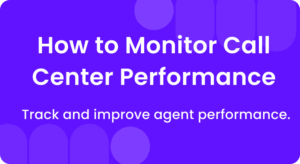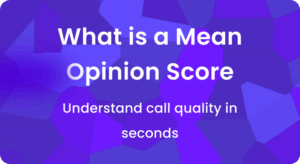Providing top-notch customer service every single day isn’t just a goal for your call center reps—it’s a promise they keep.
At the core of this commitment is contact center performance management.
It helps to optimize processes, train agents, and develop strategies. This will outshine competitors and boost customer satisfaction.
Poor service costs businesses $75 billion a year. This shows the need for good call center management in today’s competitive market.
It’s not just tools and metrics—it’s a strategic approach aimed at excellence and lasting customer relationships.
In this article:
We’ll cover contact center performance management—its importance, practical improvement techniques, and essential best practices for reps.
With these insights, your team will manage interactions well. This will nurture satisfaction and loyalty with every call.
A. What is contact center performance management?
Contact center performance management ensures the call center staff is at their best. They must help customers and meet company goals. It involves:
- Planning out what needs to be done and telling everyone what’s expected.
- Keeping an eye on how well everyone is doing their job.
- Giving feedback to employees on how they’re doing.
- Rewarding people when they do a good job.
- Helping people get better at their jobs if they need it.
- Finding ways to make the team work better together.
- Using tools like recording calls and looking at data to help improve things.
By doing all this, call centers can:
- Find ways to train their agents better.
- Make more customers happy.
- Get more people to buy things or use their services.
- Help each person on the team get more work done.
- Make sure the company is making money and growing.
Managing contact center performance is key. It aligns the team with the organization’s goals and ensures great customer service.
It’s an ongoing process that requires continual attention and adjustment to succeed.
B. What is the importance of call center performance management?
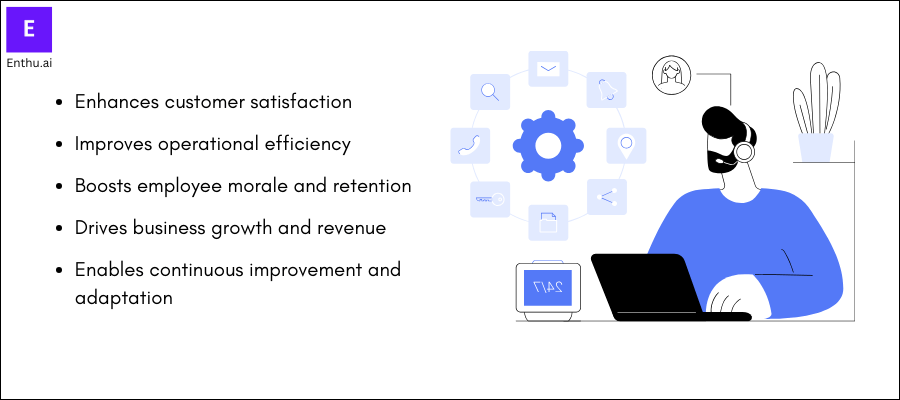
1. Enhances customer satisfaction
Investing in performance management for your contact center can help. It will give your agents the knowledge and tools to respond to consumer inquiries.
This will result in shorter wait times, improved communication, and quicker problem-solving.
Happy customers often share their experiences. This boosts customer satisfaction and strengthens brand loyalty.

2. Improves operational efficiency
By using contact center performance management, you can avoid making assumptions.
You can find areas for more efficient operation. Use quality assurance programs and performance metrics.
Agents can take more calls by streamlining procedures and removing bottlenecks. This helps maintain quality.
This results in fewer errors, less downtime, and a more productive operation overall.
3. Boosts employee morale and retention
The core of your contact center is made up of agents.
They are more likely to stick around when they feel empowered and supported.
Contact center performance management should do more than track data. It should inspire and appreciate workers.
Training, feedback, and chances to advance show employees their work matters. This boosts morale and lowers turnover.
4. Drives business growth and revenue
A strategically vital resource for increasing revenue, a well-managed contact center is more than just a cost center.
Trained agents can quickly respond to sales inquiries. They can also cross-sell or upsell products and services.
To boost customer satisfaction and quickly solve problems, you can build a good reputation. Happy customers will share their positive experiences, attracting new business.
5. Enables continuous improvement and adaptation
In today’s fast-paced business world, change is inevitable.
Contact center performance management means watching and assessing how well things are going. It also involves adapting to shifts in consumer needs and market trends.
Regular feedback gathering, performance metric analysis, and industry trend monitoring enable proactive adjustments.
This culture of improvement keeps your company competitive. It prepares it for long-term success and growth.
Enthu.AI enables businesses to effectively optimize their contact center performance management by monitoring and evaluating customer calls monitoring.
C. How to optimize your contact center performance management
1. Set clear objectives
Ensure that everyone in your contact center is aware of their specific goals.
Clear goals make it easier for everyone to stay on task and cooperate.
When the objectives are clear, it is simpler to understand how your work fits into the company’s overall success.
Establishing clear objectives also facilitates tracking advancement and acknowledging successes along the route.
Without clear objectives, people may not know what is expected of them, which could cause confusion and inefficiency.
Clear objectives give your team focus and direction. This can boost motivation and morale.
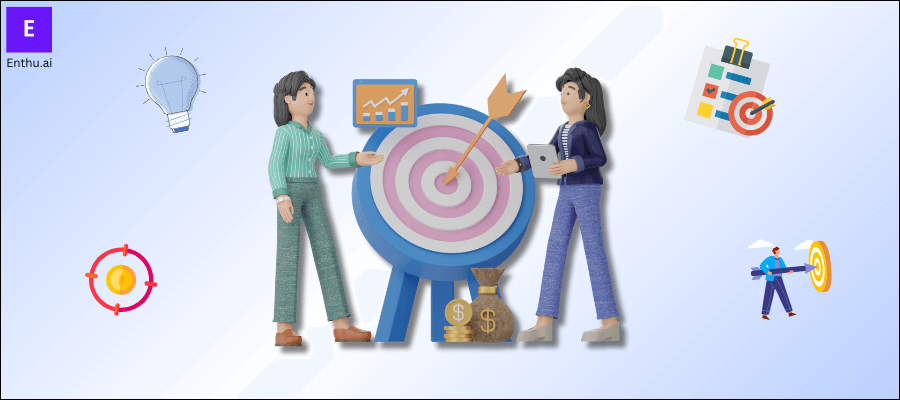
2. Utilize performance metrics
Use data and statistics to assess your agents’ performance.
Customer satisfaction scores and call resolution times are key metrics. They show what’s working and what needs improvement.
By monitoring these kpis, you can spot trends and patterns to help you make informed decisions.
Performance metrics set a standard for tracking progress and goals.
These metrics let you find problem areas. Then, you can implement plans to boost productivity and effectiveness.
3. Implement quality assurance programs
You can find areas where agents are succeeding and where they need help. Do this by monitoring their performance and giving them feedback.
Quality assurance programs help you spot patterns in client feedback. This lets you make data-driven choices to improve your offerings.
Quality assurance programs boost customer satisfaction and loyalty. They ensure clients get good, consistent service from your contact center.
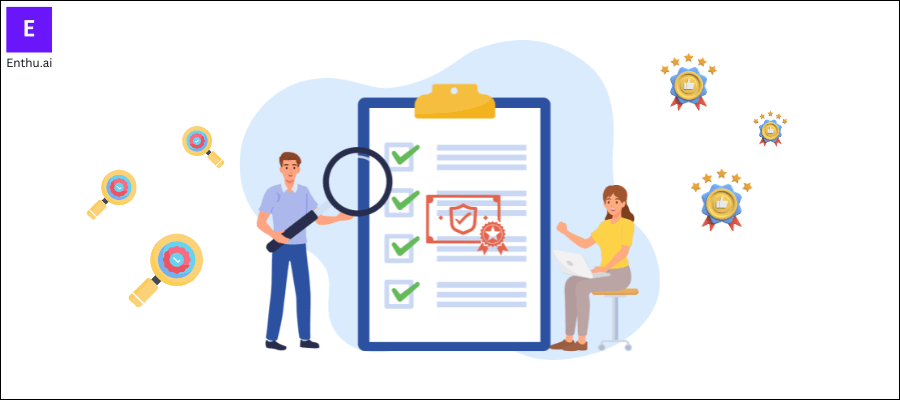
4. Provide ongoing training
Invest in your agents. Give them access to learning and education opportunities for their professional development.
Ongoing training ensures your reps have the skills to deliver great customer support.
Training on industry trends and best practices can boost an agent’s skills and confidence in meeting customer needs.
Ongoing training boosts employee satisfaction and reduces turnover. It keeps agents motivated and engaged in their work.
Empowered and inspired agents are more likely to provide great customer service. They will also help the contact center succeed.
5. Indulge speech analysis
Use speech analytics tools to learn more about consumer interactions and communication patterns.
Speech analysis can spot patterns, attitudes, and opportunities for development in client interactions.
You can change your communication strategies to match your customers’ needs. Just look at speech data for insights.
You can also find areas where agent performance can be enhanced by coaching and training by using speech analysis.
You can improve customer satisfaction and communication strategies by utilizing conversation intelligence software.
6. Agent evaluation and coaching
Assess an agent’s performance regularly and give them helpful criticism to improve.
By evaluating each agent, you can determine their performance strengths and areas for improvement.
By providing ongoing coaching and support, you can help agents. They will then build their skills and confidence in delivering great customer service.
Coaching encourages agents to maintain their best work. It does this by recognizing and celebrating their accomplishments.
Frequent coaching and evaluation create a learning culture in the contact center. This raises customer satisfaction and loyalty.

7. Optimize scheduling
Make sure you have the appropriate number of agents on hand to handle client inquiries effectively.
Optimized scheduling maximizes resource utilization while reducing customer wait times.
We can balance workloads and staffing in schedules. We can do this by analyzing past data and forecasting future demand.
Optimized scheduling helps you allocate resources better. It also ensures clients get help quickly during peak hours.
Optimized scheduling helps agents meet customer needs. It boosts satisfaction and loyalty.
8. Encourage collaboration
Motivate agents to cooperate as a team and share knowledge.
Agents are encouraged to work together to solve issues and exchange best practices.
By promoting teamwork, you can use the group’s collective expertise to create unique solutions for your clients’ issues.
Collaboration in the contact center also creates a feeling of community and camaraderie that boosts spirits and improves job satisfaction.
When agents feel supported and valued by their peers, they are more likely to provide exceptional service to customers.
9. Offer incentives and recognition
Reward and encourage high-achieving agents to promote the intended behaviors and results.
A variety of incentives and recognition options are available, including cash payouts, public recognition, or special access.
Recognizing and celebrating accomplishments can foster a culture of excellence in the contact center. It will also reinforce positive behaviors.
Rewards and recognition increase agent motivation and morale, which raises performance and engagement levels.
Agents are more willing to exceed customer expectations when they feel valued.
10. Monitor agent performance
Monitoring agent performance in real time is crucial for identifying and fixing issues as soon as they arise.
Track key metrics, like call volume, response times, and customer satisfaction.
You can quickly find trouble spots in the agents’ work. Monitor their performance and provide guidance and support.
Monitoring calls and quality in customer interactions can increase customer loyalty and satisfaction.
Agents perform better when they know their work is being watched. They stay focused and accountable for delivering excellent service.
11. Gather customer feedback
Get feedback to better understand customer experiences.
Feedback provides insights into what is effective and what requires improvement.
Pay attention to your customers to spot trends and opportunities for improvement.
Use feedback to adjust tactics. This will improve service, increasing client happiness and loyalty.

12. Promote employee engagement
Promote participation to motivate and enable employees.
Participation encourages responsibility and commitment to organizational goals.
To promote a positive work environment, include workers in decisions. Also, give them growth opportunities.
Staff who excel at customer service boost employee satisfaction and business success.
13. Regularly review and adapt strategies
To stay adaptable and responsive, constantly reevaluate and adjust your strategy.
Regular reviews help you assess performance and identify areas that require improvement.
Know the latest in your industry and your customers’ tastes. This lets you adjust your tactics to meet changing needs.
Adaptation drives growth. It helps companies stay competitive by ensuring their work is effective and relevant.
Conclusion
Beyond tools and metrics, contact center performance management is a strategic approach to excellence and long-lasting customer relationships.
Its significance cannot be emphasized, as it can lead to increased customer satisfaction and business expansion.
Leveraging call center software such as enthu.AI can improve performance and streamline operations for businesses looking for all-inclusive solutions.
Contact center performance management can be prioritized to continuously provide exceptional service, nurture customer satisfaction, and build loyalty with every interaction.
This can be achieved by leveraging cutting-edge tools and strategies.
To foster lasting success and produce unforgettable experiences, it’s not enough to merely meet expectations—you also need to surpass them.
FAQs
1. What is customer service performance management?
Customer service performance management involves tracking and optimizing key metrics to ensure high-quality service delivery and customer satisfaction.
2. What is the difference between AHT and TAT?
AHT (Average Handle Time) measures the average duration of customer interactions, while TAT (Turnaround Time) refers to the time taken to complete a task or resolve an issue, encompassing various stages of a process.
3. Why is customer service performance important?
Customer service performance is vital for maintaining customer loyalty, brand reputation, and overall business success by ensuring efficient, effective, and satisfactory interactions with customers.
4. What is contact center performance management?
Contact center performance management refers to the process of monitoring, analyzing, and improving the performance of agents, teams, and the overall contact center. The goal is to enhance customer satisfaction, optimize operations, and meet business objectives.
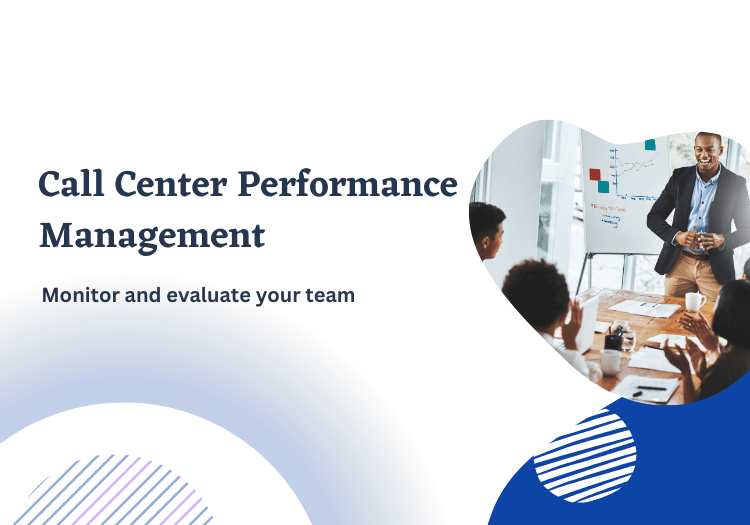




 On this page
On this page
